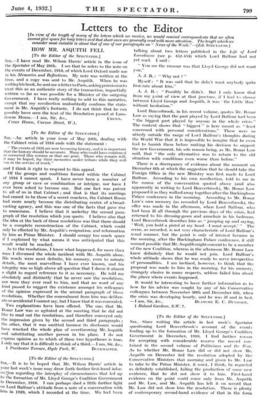[To the Editor of the SPECTATOR.] Sire,—An article in your
issue of May 28th, dealing with the Cabinet crisis of 1916 ends with the statement : " The events of 1916 are now becoming history, and it is important that the history should be accurate. Many who could havo confirmed or corrected this version or that are gone. Those who remain will, it may be hoped, lay their memories under tribute while they still can in the service of truth."
and I think it right to respond to this appeal.
Of the groups and coalitions formed within the Cabinet of 1916 I cannot speak. I have never been a member of any group or cave or combination or intrigue, nor have I ever been asked to become one. But one fact was patent to all of us in that Cabinet ; and that is that its meetings had ceased to be those of a secret conclave, the Cabinet Room had more nearly become the distributing centre of a broad- casting agency, and this was one of the facts that gave rise to uneasiness. I believe that it underlay the second para- graph of the resolution which you quote. I believe also that the idea at the back of those resolutions was that there should be a complete reconstruction of the Cabinet, which could only be effected by Mr. Asquith's resignation, and reformation by hint as Prime Minister. I should occupy too much space if I explained by what means it was anticipated that this result would be reached.
As to the resolutions, I know what happened, for more than once I discussed the whole incident with Mr. Asquith alone. His words were most definite, his memory, even to minute details, the most marvellous I have ever known, and his integrity was so high above all question that I deem it almost a slight to regard reference to it as necessary. He told me absolutely and distinctly that he never saw the resolutions, nor were they ever read to him, and that no word of any kind passed to suggest the existence amongst his colleagues of the Opinion expressed in the second paragraph of those resolutions. Whether the concealment from him was deliber- ate or accidental I cannot say, but I know that it was concealed.
Two explanations have been offered. The one, that Mr. Bonar Law was so agitated at the meeting that he did not like to read out the resolutions, and therefore conveyed only the impression given by the second and third paragraphs ; the other, that it was omitted because its disclosure would have wrecked the whole plan of overthrowing Mr. Asquith' and substituting another person in his place. I do not express opinion as to which of these two hypotheses is true, I only say that it is difficult to think of a third.-1 ant, Sir, &c., 1 Porchester Terrace, Hyde Park, W. BUCKMASTER.




































 Previous page
Previous page